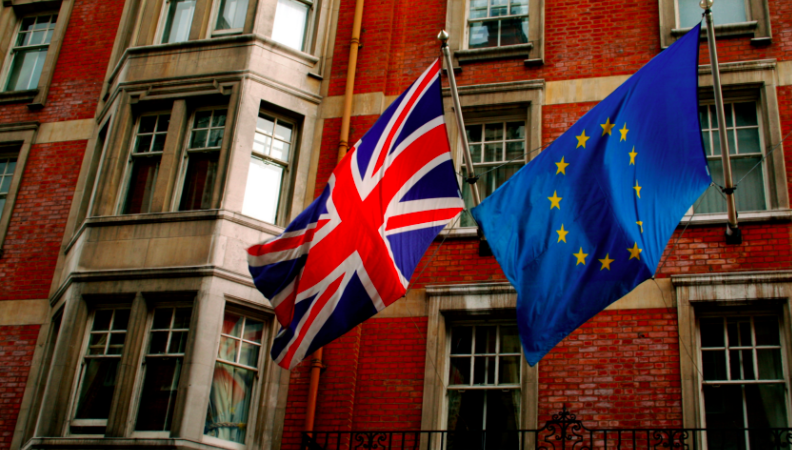Alexander Adamescu was defended by Tories when he was on the run from the law in Romania, but now he's been arrested on UK soil.

So far, rabid Brexiteers like Jacob Rees-Mogg haven’t chimed in with their opinion on Romanian businessman Alexander Adamescu’s arrest in London for alleged forgery.
This sudden silence may seem surprising, since for years they’ve been more than happy to twist Adamescu’s legal troubles into the perfect parable to fit their anti-European agenda.
As soon as a European Arrest Warrant (EAW) was issued for Adamescu in 2016, requesting his extradition to face accusations of bribing two judges in Romania along with his father, Tories were eager to believe Adamescu’s extensive media campaign.
As the multimillionaire portrayed himself as a puppy-eyed playwright either targeted for his political beliefs or caught in an elaborate plot to seize his assets—Adamescu’s never been quite sure which—Brexit campaigners pounced on the yarn he was spinning.
Conservative MP Graham Brady held Adamescu up as an example of “how Romanian justice is in no way comparable to our own” and an illustration of why the UK should renegotiate its extradition treaties.
Former UKIP MEP Steven Woolfe cited Adamescu to explain why the EAW was “an anathema to the principle of natural justice”, conveniently forgetting the hundreds of criminals extradited to the UK under the scheme, including some of the 21/7 attempted terrorists.
Meanwhile, Rees-Mogg spoke alongside Adamescu at a Conservatives for Liberty conference enthusiastically extolling the virtues of British justice and comparing continental justice to medieval sham courts.
Adamescu seemed like such a perfect poster child that the Brexiteers were happy to overlook some worrying signs, including his alleged involvement in an espionage scandal with the controversial Israeli firm Black Cube.
His latest feat came about in late March, when Adamescu was found to have forged a document allegedly issued by Romanian authorities which demonstrated the appalling conditions in the country’s prisons – and a Westminster Court judge threw him behind bars.
Whether Tories can also sweep his current address in Wandsworth Penitentiary under the rug is less certain—but their golden boy turning to pyrite is just the latest sign that Brexit, as it was imagined during the campaign, is a dangerous, amorphous fantasy.
Last week, the midpoint of the Article 50 talks provided a useful opportunity to take stock of the laundry list of promises that have already been broken, and an amusing comparison between the heady 2016 rhetoric and its dejected 2018 equivalent.
Boris Johnson’s bluster that the EU could “go whistle” if it expected the UK to pay a divorce bill somehow turned into tacitly accepting a painful series of payments stretching until at least 2064.
Government statements that free movement and the European Court of Justice’s oversight would automatically end on 29 March 2019 were discreetly walked back as it became clear that these would persist at least throughout the transition period.
Nowhere has the delusion the UK is caught in been more evident than regarding what now seems likely to be the sticking point in negotiations—the thorny question of where exactly the hard border between the UK and the EU will fall.
Through a fantastical case of what can be called wishful thinking at best, the British government has plotted “to create a fairy tale alternate reality where parts of Britain stay in a single market and customs union which they are no longer members of”.
Transport secretary Chris Grayling hinted that the UK simply wouldn’t enforce the new border at Dover, leaving both Brexit supporters and EU policymakers incredulous. Grayling and his colleagues seem blissfully unaware of how unappealing this lax border control is going to make the prospect of free trade deals with the UK seem to third countries.
As crackpot a scheme as this may be, the situation in the Irish Sea is even more dire. Whitehall illogically insists on repeating a “fundamentally inconsistent” position: that Britain will leave the single market, but somehow avoid a hard border on the Irish island.
Some MPs have suggested that there, too, the UK could simply pretend the border didn’t exist and refuse to levy tariffs—a “crude and ignorant bluff” of a solution that would run afoul of World Trade Organization regulations.
The ill-begotten pact Theresa May was forced into with the DUP after her 2017 election defeat further restricts the Prime Minister’s options, as DUP leader Arlene Foster has categorically refused any deal allowing Northern Ireland to remain in the single market.
With Foster intransigent on one hand and the Irish Taoiseach unconvinced by May’s suggested model of the U.S.-Canadian border on the other, leaving the Brits proposing border schemes so absurd that they have been described as “Narnia solutions”.
This systematic dismantling of the Brexit dream has extended to the farcical, as well. Patriots such as Conservative MP Andrew Rosindell, who ranted about the “humiliation of having a pink European Union passport”, hoped that their trauma would be soon be over—only to be crushed by the ironic decision to hand the contract for producing the new “iconic” blue and gold passports to a Franco-Dutch firm.
Staring down a bleak reality of imported passports, lorries backed up from Dover to the M25, a lit stick of dynamite under the Good Friday Agreement, and more than forty years of alimony payments to Brussels, it’s no wonder that those who were once Adamescu’s fiercest champions are turning a blind eye to his fate now.
After all, stubbornly ignoring the looming abyss seems to be the Brexiteers’ main strategy now that their dream has turned to dust.
Jo Simmons is a writer and consultant currently living in London. She tweets here.
To reach hundreds of thousands of new readers we need to grow our donor base substantially.
That's why in 2024, we are seeking to generate 150 additional regular donors to support Left Foot Forward's work.
We still need another 117 people to donate to hit the target. You can help. Donate today.



